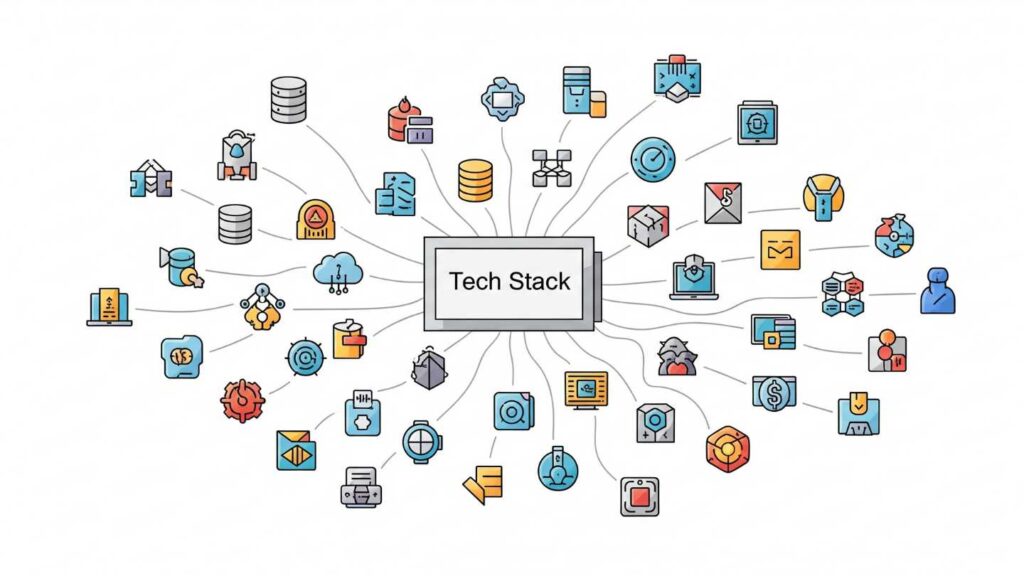As a small or medium business owner, marketing manager, or entrepreneur, you’re constantly looking for ways to boost your online presence and generate those all-important qualified leads. You’ve probably heard terms like “tech stack” and “web hosting” thrown around. While both are crucial for your digital operations, they refer to distinctly different aspects of your online infrastructure. Understanding this difference isn’t just about jargon; it’s about making informed decisions that directly impact your website’s performance, your marketing effectiveness, and ultimately, your sales.
Let’s break down what a tech stack really is and how it stands apart from web hosting.

What is a Tech Stack: Your Digital Toolkit
Think of your tech stack as the complete set of technologies, tools, and applications your business uses to build, run, and manage its digital operations. It’s not just one piece of software; it’s a combination of interconnected components that work together to achieve specific business goals, whether that’s a flawless website, efficient customer relationship management, or effective marketing campaigns.
A typical tech stack for a modern business might include:
- Front-end Technologies: These are the tools that build what your users see and interact with – the visual part of your website or application. This often includes languages like HTML, CSS, and JavaScript, along with frameworks like React or Angular.
- Back-end Technologies: This is the invisible engine that powers your website, managing databases, server-side logic, and integrations. Popular choices include Python, Ruby on Rails, Node.js, and PHP, often paired with databases like MySQL or PostgreSQL.
- Databases: Where all your information lives – customer data, product details, website content.
- APIs (Application Programming Interfaces): These allow different software applications to communicate and share data with each other, enabling seamless integrations.
- Content Management Systems (CMS): Platforms like WordPress, HubSpot, or Joomla that help you create, manage, and publish digital content.
- Marketing Automation Tools: Software for email campaigns, lead nurturing, and social media scheduling (e.g., Mailchimp, HubSpot Marketing Hub).
- CRM (Customer Relationship Management) Systems: Tools like Salesforce or HubSpot CRM that help you manage customer interactions and sales processes.
- Analytics Tools: Google Analytics is a prime example, providing insights into website traffic and user behaviour.
The beauty of a well-chosen tech stack is its ability to create a cohesive ecosystem where all your digital efforts can thrive. It’s about more than just having tools; it’s about having the right tools that work together to support your strategic objectives, like increasing qualified leads.

What is Web Hosting? The Digital Address for Your Business
Now, let’s talk about web hosting. In simple terms, web hosting is the service that makes your website accessible on the internet. Imagine your website as a house. For people to visit your house, it needs to be built on a piece of land with a physical address. In the digital world, web hosting provides that “land” and “address” for your website.
When you purchase web hosting, you are essentially renting space on a server – a powerful computer that stores your website’s files (images, text, code) and delivers them to visitors’ browsers when they type in your website address. Without web hosting, your website files would simply sit on your computer and wouldn’t be visible to anyone else online.
There are different types of web hosting available, each with its advantages and disadvantages:
- Shared Hosting: Multiple websites share resources on a single server. It’s cost-effective but can be slower if one website consumes too many resources.
- VPS Hosting (Virtual Private Server): A step up from shared hosting, providing more dedicated resources and better performance.
- Dedicated Hosting: You get an entire server to yourself, offering maximum performance and control.
- Cloud Hosting: Your website is hosted on a network of virtual servers, providing scalability and reliability.
Choosing the right web hosting plan is crucial for your website’s speed, reliability, and security. A slow website can deter visitors and negatively impact your SEO efforts, directly hindering your goal of generating qualified leads.
Key Differences: Tech Stack vs. Web Hosting
To solidify your understanding, let’s look at the core differences between a tech stack and web hosting:
Feature | Tech Stack | Web Hosting |
Definition | The collection of all technologies, tools, and applications used to build and operate digital products/services. | The service that provides the server space and connectivity to make your website accessible online. |
Purpose | To enable specific functionalities, manage data, automate processes, and create digital experiences. | To store website files and serve them to users on the internet. |
Components | Programming languages, frameworks, databases, CMS, marketing tools, CRMs, analytics. | Servers, bandwidth, storage, uptime, security features. |
Scope | Broad; encompasses all digital tools across your business. | Narrow; specifically deals with the housing and serving of your website. |
Analogy | The blueprint, building materials, tools, and equipment used to construct and operate a house. | The land and address where your house is built. |
The relationship between the two is symbiotic: your tech stack needs web hosting to exist and function online, and your web hosting provides the foundation upon which your tech stack operates. Without a robust web hosting environment, even the most sophisticated tech stack will struggle to perform.

Why Does This Matter for Your Business?
Understanding the distinction between your tech stack and web hosting is vital for several reasons:
- Informed Decision-Making: When you know what each component does, you can make smarter choices about which technologies to invest in and which hosting plan best suits your needs. This prevents overspending and ensures your digital infrastructure aligns with your business goals.
- Performance Optimisation: A powerful tech stack running on reliable web hosting leads to a faster, more secure, and user-friendly website. This directly impacts your SEO rankings and reduces bounce rates, helping you capture more qualified leads.
- Scalability: As your business grows, your digital needs will evolve. Knowing your tech stack and web hosting setup allows you to plan for future expansion, ensuring your infrastructure can handle increased traffic and new functionalities.
- Troubleshooting: When issues arise, distinguishing between a problem with your application (part of your tech stack) and a problem with your server (part of your web hosting) helps you diagnose and resolve problems much faster.
Building Your Digital Foundation for Lead Generation
For small to medium business owners, marketing managers, and entrepreneurs, the goal is always to increase qualified leads and drive sales. Your tech stack and web hosting are foundational to achieving this. A well-optimised website, powered by a robust tech stack and reliable web hosting, provides the perfect platform for your targeted marketing campaigns to thrive. It ensures your SEO efforts pay off by delivering a fast and seamless user experience, encouraging visitors to explore your offerings and convert into valuable leads.
At Xponent, we understand the complexities of building a strong digital presence. Whether you need help selecting the right components for your tech stack, finding the ideal web hosting solution, or developing a comprehensive digital strategy, our team is here to guide you. We specialise in helping businesses like yours leverage technology to grow and succeed online.
Ready to optimise your digital foundation and supercharge your lead generation efforts? Contact Xponent today to discuss your specific needs and discover how our expertise can help your business flourish. Visit our website or book a discovery call to learn more about our services.




